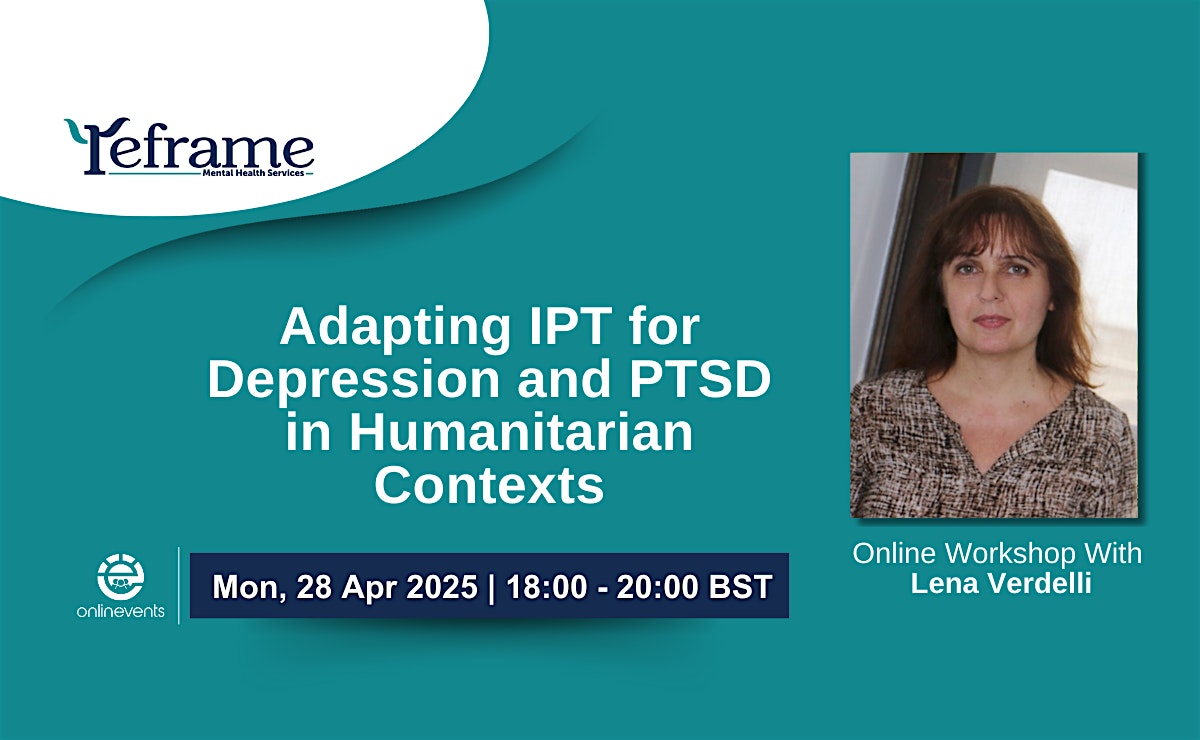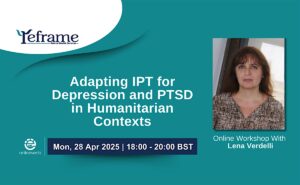About this event
This workshop will cover GMH lab’s recent IPT implementation projects with displaced adults in Peru and Bangladesh. It will focus on cultural and contextual adaptations, barriers and facilitators of service uptake, and clinical outcomes for the two sites.
Learning Objective Participants Can Expect From This Event
- Learn about process and content of cultural and contextual adaptations to optimize fit.
- Learn about barriers and facilitators to implementation, uptake, and integration into the national system of care.
- Learn about impact of IPT on depression and PTSD symptoms, and aspects of functioning.
Who is This Workshop Appropriate For?
- Clinicians, humanitarian workers, policy makers.
How May This Workshop Impact Your Practice?
- It will sensitize clinicians in modifying their practice to make IPT more compatible with the experience of clients who are displaced or migrated.
RECORDING
This event will be recorded and you can use the ticket function to pre-purchase the recording before the event. This will be useful for colleagues who are not able to attend the event live and also for those who attend the event live and want to watch it again.
ZOOM
This event will be hosted on the Zoom meeting platform where we will use our cameras and microphones to interact with each other as a group.
SELF-SELECT FEE
The self-select fee is a radical inclusion policy to open learning for all colleagues. The guide price for this event is £20.00, however, we appreciate that income varies greatly in different locations and circumstances. Please contribute what you can to help us maintain inclusive professional training.
___________________________
At Onlinevents, we and the presenters we collaborate with are committed to working in a way that aligns with the ethical codes and frameworks of our respective professional organisations. We expect all colleagues attending our events to uphold the ethical principles of their professional membership.
If you are not a member of a professional organisation, we ask that you participate in a way that is both authentic and respectful, fostering a space of mutual learning and professional engagement.
By registering for this event, you agree to be present and interact in a manner that reflects these principles.
Lena Verdeli, Ph.D, MSc

Lena Verdeli is an Associate Professor of Clinical Psychology and Co-Director of Clinical Training of the Clinical Psychology Doctoral Program at Teachers College, Columbia University. As Founder and Director of the Global Mental Health Lab at Teachers College, Verdeli has received federal and foundation funding to study psychotherapy for prevention and treatment of mood disorders. Over the past fifteen years, Verdeli has played a key role in landmark studies involving adaptation, training, and evaluation of psychotherapy protocols used by specialists and non-specialists (psychologists, psychiatrists, primary care staff, community health workers, etc.) around the globe with depressed adults in southern Uganda; war-affected adolescents in IDP camps in northern Uganda and depressed IDP women in Colombia; distressed patients in primary care in India; depressed community members in Haiti; and war-affected Syrian refugees in Lebanon, Venezuelan refugees in Peru, and Rohingya refugees in Bangladesh, among others.
Verdeli also serves as a Scientific Advisory Council member of the American Foundation for Suicide Prevention and as a Technical Advisor for the WHO, Division of Mental Health and Substance Use for the global dissemination of group interpersonal psychotherapy (IPT) under WHO copyright. She received the American Psychological Association International Psychology Division Mentoring Award and chaired the research workgroup of the Family NGO at the UN.
Verdeli’s research in Uganda was instrumental to collecting the data necessary for WHO to recommend IPT – together with cognitive behavioral therapy and antidepressant medicines – as a recommended treatment for depression. In her words: “IPT is not new; what’s new is our delivery of it and our model of training others to use it. Whether we train laypeople to use IPT with their fellow community members, as we did in Uganda, or train professionals through a systematic national effort, as we did in Lebanon, our hallmark is to employ inexpensive, feasible, and culturally relevant approaches. The work has to be the result of real partnerships on the ground, in which all the players have a voice – including refugees themselves.”
Website | www.tc.columbia.edu



